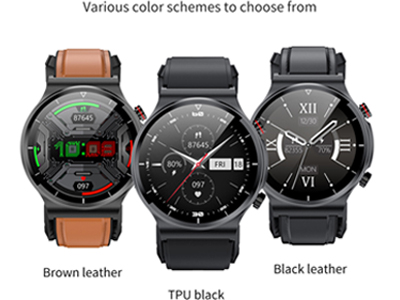How To Get The Most Out Of Walking
Apr 18, 2023
The Best Smart Watches
Walking is the most popular and easiest way to keep fit. You don't need a gym and equipment, you just need to stretch your legs.
However, walking also has a lot of knowledge, for example, how to walk, when to walk, how long can you get the most benefit from walking?
When do you go for a walk?
Walking is not only about exercise, but also about light.
The first thing to say is that walking is certainly good for you no matter what time of day you choose, but research shows that there may be additional benefits to walking in the morning.
That's because walking isn't just about exercise, it's also about light. Natural light is crucial, but there is a difference between going for a walk during lunch, in the afternoon, or after work, versus walking in the morning when natural light wakes up the mind and body.
Morning light helps adjust the body's internal biological clock, which tells us when to sleep and when to wake up. If you go for a walk in the morning, it is equivalent to telling yourself that the day has begun, so that when it is time to go to bed at night, the body is ready and can make people fall asleep smoothly.
What's more, going for a walk in the morning and getting more exposure to natural light can also help reduce production of the sleep-promoting melatonin, making you feel more refreshed and awake during the day.
If you have trouble falling asleep at night, it likely has something to do with not getting enough natural light during the day, especially in the morning. Exposure to natural light is good for sleep, preferably as early as possible in the morning.
Not only that, but it will have a positive effect on the quality and quantity of your sleep, avoid waking up in the middle of the night, and lead to deeper, better quality sleep.
Walking works best within two hours of waking up.
So what if you're not the kind of person who is willing and able to get up early? After all, there are both owls who go to bed late and wake up late in the world, and larks who like to go to bed early and get up early.
Don't worry, just go for a walk within 2 hours of waking up normally.
If you are an "owl" but want to change yourself, this kind of early walking exercise may be what you need. It only takes a few weeks to see results.
There are benefits to walking anytime.
It's even better if you wake up when the sun comes up, but even when the sky doesn't look bright (especially in winter), there's still plenty of blue or short-wavelength light that our eye receptors Very sensitive to blue light and therefore has a positive effect on us.
Our internal biological clock is not actually 24 hours, it is a little longer than 24 hours.
So one of the purposes of bright natural light in the morning is to reset our body clock every morning, so it is especially beneficial for the human body, especially in winter when the days are shorter and we have less exposure to natural light. This can throw our body clocks out of whack and, in some people, can lead to low mood and even depression.
If we don't reset our body clocks every morning, we will feel tired and groggy.
Light doesn't just affect your body's melatonin levels, it also triggers the body to release serotonin, a chemical that makes you feel good
Serotonin has a natural mood-enhancing effect, and it's so powerful it can reset your brain chemistry and even change the way you think about things.
What's the point of walking fast or slow?
Walking briskly for 30 minutes a day can play a fitness role.
Knowing the best time to walk, does speed also matter?
In this regard, Marie Murphy, a professor of exercise and health at the University of Ulster in Northern Ireland, said that brisk walking (brisk walk) can help longevity.
The large amount of data research and analysis of walking on cardiovascular disease and cancer mortality they have done found that as long as more walking will reduce cancer mortality.
But for cardiovascular disease, brisk walking can provide better protection. For example, brisk walking can reduce the risk of cardiovascular disease by 10-20% for the same number of steps taken.
So what counts as brisk walking? Professor Murphy says you're at brisk walking speed when you can feel your heart beating faster, your body warming up and breathing faster than normal. At this point you can still speak normally, but you can no longer sing.
However, everyone's speed may be different, as long as you find your own brisk walking rhythm.
Before or after meals?
Whether or not you eat breakfast before your walk has different benefits.
So, should walking in the morning be better before breakfast or after breakfast?
Professor Murphy said research on this had been mixed. There is some evidence that walking while skipping breakfast may be more beneficial for weight loss and glycemic control; however, walking after breakfast is better for breaking down and processing fat and sugar in the body.
The choice is all personal, but Professor Murphy and Dr Mosley believe it's best to eat something before going for a walk in the morning.
We already know that a brisk walk in the morning can benefit the body the most, so how long should you walk to get the exercise effect?
Professor Murphy said current advice was that people should exercise for 30 minutes a day. But if you can't complete half an hour of brisk walking in the morning, you can also divide it into two or three times.
Professor Murphy said that unlike other exercise methods, walking exercise is very flexible and more suitable for several times.
Professor Murphy also said that, in fact, it may be more beneficial if you can walk several times, because walking can promote metabolism, especially at present, many people are working at home, and every time you go out for a walk, it can make people recover from a sedentary state. Get active so you can get the most out of it.
If there's one thing you want to do to improve your physical and mental health, why not try walking? But don't forget, go fast! You can also wear BP Smartwatch to sense changes in your body data.












